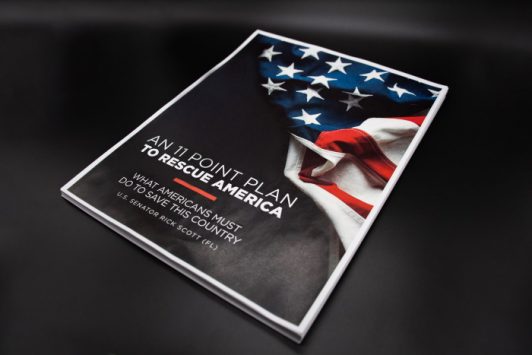A multipart policy plan released by Sen. Rick Scott on Feb. 22 says “all Americans” should have to pay “income tax,” while saying that “over half of Americans” currently do not.
But in an interview later that day, after criticism from congressional Democrats, the Florida senator falsely claimed that he had not suggested increasing federal income taxes for that many people.
“Of course not,” Scott said when Fox News’ Sean Hannity asked him if his plan called for raising taxes “on more than half of Americans,” including seniors and working families, as Senate Majority Leader Chuck Schumer had tweeted.
Hannity told Scott that he could not locate the proposed tax increase in Scott’s plan and joked that it may have been written in “invisible ink.”
We found it on page 35 of the proposal — titled “An 11-Point Plan to Rescue America” — which clearly states: “All Americans should pay some income tax to have skin in the game, even if a small amount. Currently over half of Americans pay no income tax.”

That is presumably a reference to recent estimates of the percentage of U.S. “tax units” who owed no federal income tax.
In an August 2021 analysis, the nonpartisan Tax Policy Center estimated that about 102 million, or 57.1%, of all tax units would have zero or negative income tax liability in 2021 — down slightly from the nearly 107 million, or 60.6%, of all tax units who owed no federal income tax in 2020.
TPC defines a tax unit as “an individual, or a married couple, that files a tax return or would file a tax return if their income were high enough, along with all dependents of that individual or married couple.” Those who owe no income tax to the federal government usually earn too little or qualify for a variety of deductions and refundable tax credits that negate any income tax they would have owed.
From 2011 to 2019, before the COVID-19 pandemic, the estimated percentage of tax units with no income tax liability varied between 42% and 45%. The large increase in the last two years was “due to a combination of a poor economy and multiple rounds of tax-based assistance to hard-pressed households,” as TPC senior fellow Howard Gleckman explained in a blog post last summer.
Beginning in 2022, assuming the economic recovery continues, TPC projects that the percentage not owing any federal income tax will return to pre-pandemic levels and then decline through 2031. That’s based on tax policies that were in effect as of August 2021, TPC says.
So how does Scott justify denying that his proposal would be an income-tax increase for all of those people?
In a statement to FactCheck.org, a spokesman for Scott said the senator actually wants to focus on only a subset of U.S. residents who don’t pay federal income taxes nor payroll taxes for Social Security and Medicare.
“Senator Scott believes that everyone should pay their fair share, and everyone should have skin in the game,” said Chris Hartline, communications director for the National Republican Senatorial Committee, which Scott heads. “There are too many people who are benefiting from government services without contributing to the system. That obviously would not include retirees who have paid plenty in taxes or working Americans who are paying into the system through either income tax or payroll tax. He believes there are too many able-bodied Americans who are choosing not to work, partly due to policies from Joe Biden and the Democrats, that have expanded the welfare state and paid people more to not work than to work. That should change.”
But nowhere in Scott’s plan does it say he was referring to only able-bodied, nonretirees who receive government benefits but don’t work and don’t pay federal income taxes or payroll taxes. That very specific description does not apply to “[o]ver half of Americans” — the language used in Scott’s plan.
TPC estimated that 19.3% — or 34.4 million — of all tax units would owe neither federal income nor payroll taxes in 2021. That was down from an estimated 20.5%, or 36 million tax units, who did not have to pay either tax in 2020 — but up from 16.8%, or 29.2 million tax units, who were exempt from those taxes in 2019.
Even those estimates include more people, such as elderly and disabled Americans, than the narrow group that Scott’s spokesman now claims he wants to target.
Update, June 9: CNN reported that, on June 9, Scott changed the income tax language in his proposal. It now reads: “Able bodied Americans under 60, who do not have young children or incapacitated dependents, should work. We need them pulling the wagon and paying taxes, not sitting at home taking money from the government. Currently, far too many Americans who can work are living off of the hard work of others, and have no ‘skin in the game’. Government must never again incentivize people to not work by paying them more to stay home.”
FactCheck.org does not accept advertising. We rely on grants and individual donations from people like you. Please consider a donation. Credit card donations may be made through our “Donate” page. If you prefer to give by check, send to: FactCheck.org, Annenberg Public Policy Center, 202 S. 36th St., Philadelphia, PA 19104.